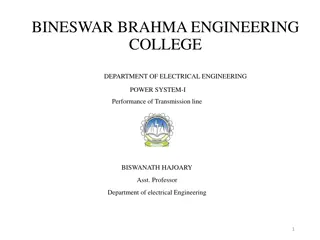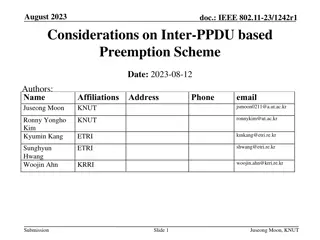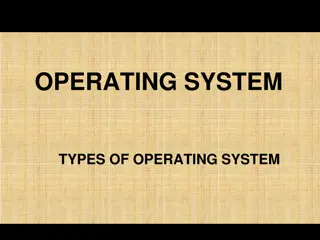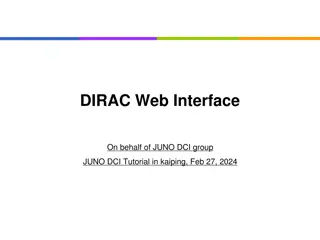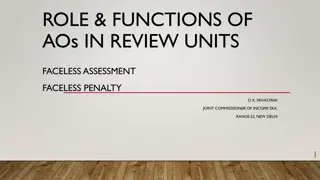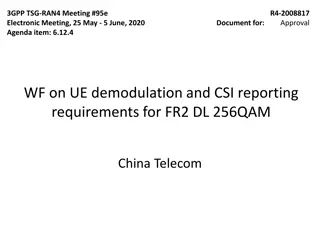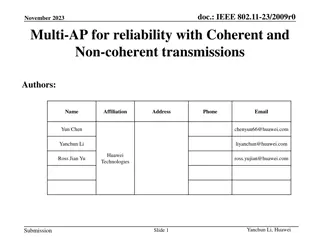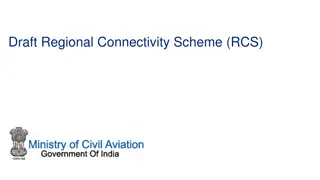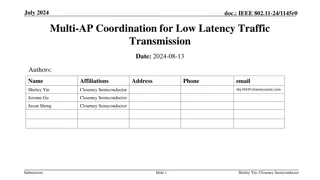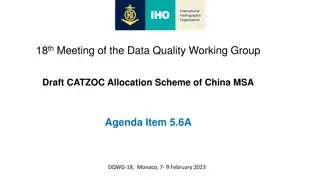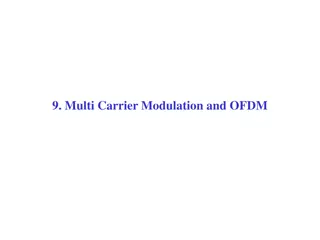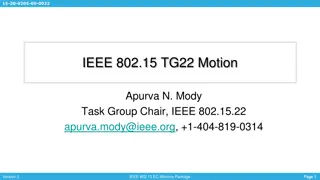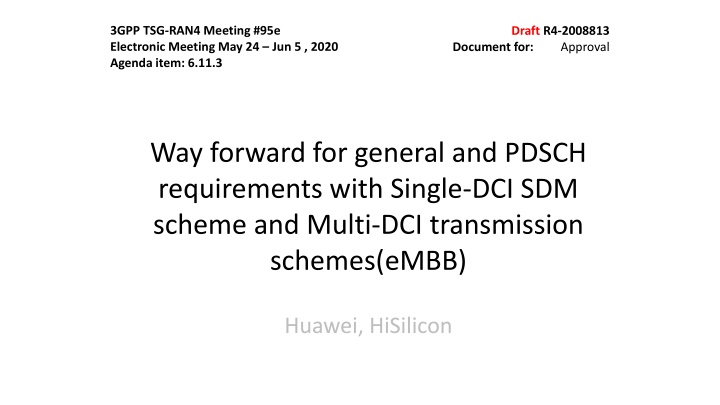
Advanced PDSCH Requirements for eMBB: Multi-DCI Transmission Scheme Analysis
Explore the latest developments in PDSCH requirements for eMBB, focusing on single-DCI and multi-DCI transmission schemes. The agenda includes discussions on timing and frequency offsets among multi-panel/TRP setups, general test setups, TRS/CSI-RS configurations, multi-DCI based PDSCH requirements, and resource allocation options. Various companies like Huawei, Samsung, Qualcomm, and more present their recommendations for further evaluation.
Download Presentation

Please find below an Image/Link to download the presentation.
The content on the website is provided AS IS for your information and personal use only. It may not be sold, licensed, or shared on other websites without obtaining consent from the author. If you encounter any issues during the download, it is possible that the publisher has removed the file from their server.
You are allowed to download the files provided on this website for personal or commercial use, subject to the condition that they are used lawfully. All files are the property of their respective owners.
The content on the website is provided AS IS for your information and personal use only. It may not be sold, licensed, or shared on other websites without obtaining consent from the author.
E N D
Presentation Transcript
3GPP TSG-RAN4 Meeting #95e Electronic Meeting May 24 Jun 5 , 2020 Agenda item: 6.11.3 Draft R4-2008813 Approval Document for: Way forward for general and PDSCH requirements with Single-DCI SDM scheme and Multi-DCI transmission schemes(eMBB) Huawei, HiSilicon
Background Agreed WF in the previous meetings: R4-2002419 WF on demodulation and CSI requirement for NR eMIMO, RAN4#94-e R4-2002420 WF on PDSCH demodulation requirements based on multi-TRP transmission for NR eMIMO, RAN4#94-e R4-2005529 WF on PDSCH demodulation requirement and General aspects for NR eMIMO, RAN4#94-e-Bis
General test set-up for PDSCH requirements Timing offset among multi-panel/TRP Further discuss the reference receiver assumption for multi-TRP time tracking to decide if negative timing offset needs to consider Option 1: t = 2 t1, t1= [-0.5, 2] s (MTK, Samsung) Option 2: t = 2 t1, t1= 2 s (Huawei, Ericsson) Option 3: Using {-1, -0.5, 1, 2, 3} s as candidate values for further evaluation(Samsung) Other TO values not precluded Recommended WF Introduce timing offset which scaled with SCS t = 2 t1? Frequency offset among multi-panel/TRP Keep two options for further evaluation Option 1: 200Hz for FR1 FDD 15kHz, 300Hz for FR1 TDD 30kHz (Samsung, Huawei, MTK, Ericsson, Qualcomm) Option 2: 300Hz for FR1 FDD 15kHz, 600Hz for FR1 TDD 30kHz (Intel) Recommended WF Option 1?
General test set-up for PDSCH requirements TRS/CSI-RS configuration Taking non-colliding TRS/CSI-RS in multi-TRP/panel as baseline assumption meanwhile interested companies are encouraged to bring more analysis and evaluation results for non-colliding and colliding cases.
Multi-DCI based PDSCH requirements Resource allocation Option 1: Only non-overlapping cases (Huawei, Qualcomm, MTK, Intel, Ericsson, Apple) Option 2: Both non-overlapping and full-overlapping cases (Samsung) Recommended WF Agree Option 1, one company proposed to further check Option 2 in the 2ndround CRS rate-matching Do not define performance requirements for multi-DCI based multi-TRP with UE rate-matching around configured CRS pattern. PDCCH configuration K0 = 0, AL = 8
Multi-DCI based PDSCH requirements PDSCH configuration for each TRP PDSCH resource mapping type: Type A Resource allocation type: Type 1 DM-RS configuration: Type 1 with single-symbol DM-RS: 1+1 Antenna ports indexes: {1000,1001} and {1002,1003}, i.e. different CDM groups for two TRPs Starting symbol (S): 2 Time duration (L): 12 Frequency domain: half of the maximum bandwidth by indicating the start resource block , the allocated resource blocks
Multi-DCI based PDSCH requirements PDSCH configuration for each TRP Antenna configuration: Option1: Only 2T2R, 2T4R Option2: Both 2T2R, 2T4R and 4T2R, 4T4R Number of test cases Option1: 3 test cases per duplex mode (Samsung) Test 2a Multi- DCI with frequency offset and Non-overlapping scheduling Test 2b Multi DCI with positive time offset and Non-overlapping scheduling Test 2c Multi DCI with negative time offset and overlapping scheduling Other options are not preclude
Single-DCI based multi-TRP/Panel Introduce PDSCH demodulation requirements for Single- DCI based SDM scheme with full-overlapping resource allocation Layer combination: 1+1 for both 2Rx and 4Rx Number of TCI state: Two TCI states configuration Number of test cases Option 1: 3 test cases per duplex mode (Samsung) Test 1a Single DCI with frequency offset and overlapping scheduling Test 1b Single DCI with positive time offset and overlapping scheduling Test 1c Single DCI with negative time offset and overlapping scheduling Other options are not preclude
Performance requirements for multi-panel/TRP in FR2 Necessity of introducing test case(s) for multi-panel/TRP transmission schemes in FR2 Option 1: No (Huawei, Qualcomm, MTK) Option 2: Do not define FR2 requirements for simultaneous reception from multi-TRP/Panel (eMBB) and Study testability for FR2 single-DCI based multi-TRP schemes 3 and 4 (Intel) Option 3: Introduce PDSCH demodulation requirements with Multi- Panel/TRP transmission schemes (eMBB) in FR2 with single wide Rx beam assumption. (Samsung)
TCI state configuration for FR2 Option 1: Single Type D (Samsung) TCI index Information Type 1 QCL information Type 2 QCL information FR2 SSB #0 Type C SSB #0 Type D SSB index QCL Type SSB index QCL Type TCI state #0 Type 1 QCL information CSI-RS resource CSI-RS resource 1 from CSI-RS for tracking configuration QCL Type Type A TCI state #1 Type 2 QCL information CSI-RS resource 1 from CSI-RS for tracking configuration CSI-RS resource Type D QCL Type Type 1 QCL information CSI-RS resource 2 from CSI-RS for tracking configuration CSI-RS resource Type A QCL Type TCI state #2 Type 2 QCL information CSI-RS resource 1 from CSI-RS for tracking configuration CSI-RS resource QCL Type Type D Other options not precluded


